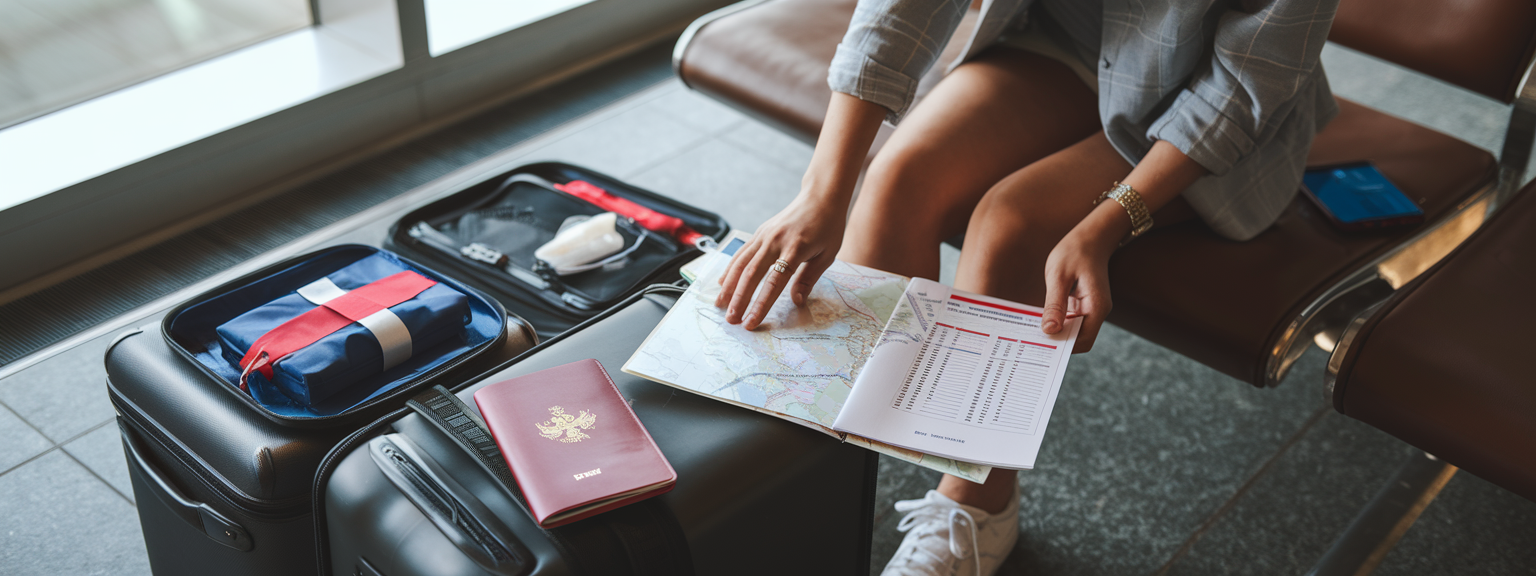Managing Travel Emergencies: How to Stay Safe and Prepared Anywhere
Every traveler hopes for smooth sailing, but the reality is that Managing Travel Emergencies is an essential part of any adventure. From flight cancellations and lost passports to medical emergencies abroad, being caught unprepared can quickly turn a dream trip into a stressful situation. Fortunately, with proper emergency travel preparation and awareness, you can protect yourself, stay calm, and handle any situation effectively. In this guide, you’ll discover proven travel safety tips and tools for smart travel crisis management—ensuring that you stay safe and confident wherever you roam.
📍Must-See Attractions: The Essentials of Emergency-Ready Travel
Travel Insurance — Your Safety Net
A solid travel insurance policy is non-negotiable when it comes to Managing Travel Emergencies. It covers medical expenses, trip cancellations, and even lost baggage. Compare policies carefully—look for 24/7 support, medical evacuation coverage, and direct payment for hospitals abroad. A reliable plan transforms potential chaos into a manageable inconvenience.
Keep Emergency Contacts Handy
Save essential contacts on paper and digitally: your embassy, local hospitals, travel insurance hotline, and credit card providers. In a true emergency, internet access might fail, and having local numbers can speed up assistance significantly.
Build a Travel Emergency Kit
Your travel emergency kit should include basic medications, bandages, antiseptic wipes, a power bank, a flashlight, and a copy of vital documents. Consider regional risks—like insect repellent for tropical countries or a reusable mask for urban trips.
Digital Backups and Cloud Access
Create encrypted digital copies of important documents—passport, visas, tickets—and store them in the cloud. Should you lose your physical items, quick access to these files can expedite embassy or consulate assistance within hours.
🎭 Local Culture & Experiences
Understand Cultural Safety Norms
What’s considered appropriate in one country might be risky in another. For example, photographing people during festivals could attract unwanted attention in some areas. Learn about local customs, emergency numbers, and what gestures or attire are considered respectful before arriving.
Health and Food Safety While Traveling
If you’re tasting local cuisine, know the signs of food poisoning and the nearest clinics. Keep antihistamines handy if you have allergies. Being cautious about street food hygiene ensures that cultural immersion doesn’t result in a medical setback.
Stay Aware During Local Events
Crowded festivals can be hotspots for theft and disorientation. Always discuss emergency meeting points with your travel companions and keep valuables minimal. When a celebration gets overwhelming, knowing exit routes and police posts is invaluable.
A personal example: During Songkran in Bangkok, I lost my wallet in the crowd, but the kindness of locals and prompt tourist police assistance turned potential panic into a lesson on cross-cultural empathy in crisis.
🔑 Hidden Gems & Insider Tips
Register with Your Embassy
Few travelers realize that you can register your travel plans with your embassy online. This service allows governments to reach you in case of natural disasters, civil unrest, or other emergencies—making it an invaluable layer of security for long trips or remote destinations.
Learn Local Emergency Phrases
Knowing how to say “Help,” “Doctor,” or “Police” in the local language can instantly improve response times during crisis situations. Download a small dictionary or use translation apps offline for critical words related to Managing Travel Emergencies.
Use Smart Travel Apps
Many apps now offer real-time safety maps, embassy contacts, and emergency translation features. Use them to find medical facilities or safe zones. Staying digitally informed means less panic and more control during adverse situations.
Lastly, always know your nearest hospital or consulate the moment you arrive. Adding this to your to-do list ensures that if something happens, you can act fast instead of panicking.
🗓️ Sample Itinerary or Day Plan
Here’s how a “safe travel day” might look to balance fun and preparation:
- 8:00 AM: Review your daily route, confirm emergency contacts, and check weather or political alerts.
- 12:00 PM: Explore local attractions with a light, secure bag. Keep essentials zipped and use a money belt or crossbody bag.
- 3:00 PM: Identify nearby clinics, police posts, and pharmacies. This knowledge could be lifesaving in an emergency abroad.
- 7:00 PM: Back up photos, receipts, and scanned IDs to cloud storage before heading out for dinner or rest.
Budget-wise, expect to invest around $15–$50 in safety essentials: a local SIM, power bank, or travel med kit. Those simple choices make Managing Travel Emergencies far easier if issues arise.
💡 Travel Tips Specific to the Destination
Packing for Safety
Always pack duplicate credit cards in separate bags, carry extra passport photos, and include a personal health summary. These small steps help you handle a lost passport or medical emergency abroad with minimal disruption.
Respect Local Etiquette
Politeness goes a long way during travel crisis management. Always address locals respectfully and avoid heated disputes. Calmness and courtesy can often resolve unexpected travel problems faster than arguments.
Timing and Research
Avoid visiting destinations during local protests, election seasons, or monsoon months. Real-time updates from travel advisory websites or embassy bulletins help you plan more strategically and travel stress-free.
Book Smart & Stay Connected
Choose accommodations near hospitals or embassies, and always leave your itinerary with a trusted contact at home. Reliable Wi-Fi, a local SIM card, and a charged power bank ensure that you’re reachable even in emergencies.
📝 Step-by-Step Guide: Managing Travel Emergencies Efficiently
When adversity strikes, follow these steps:
- Stay calm and assess immediate danger.
- Call local emergency numbers for police, health, or rescue services.
- Use online embassy registration tools for urgent assistance.
- Inform your travel insurance provider immediately; delays can affect coverage.
- Keep digital and physical copies of receipts or hospital proofs for claim purposes.
💼 Expert Tips for Managing Travel Emergencies Like a Pro
Seasoned travelers develop reflexes in crisis scenarios: they know when to seek help, when to pause travel, and when to contact local authorities versus their embassy. Always keep backups of funds in different formats—cash, mobile wallet, and card—since certain crises disable electronic transactions.
📱 Best Apps for Managing Travel Emergencies on the Go
Apps like Sitata and SmartTraveler provide live updates about health risks or unrest worldwide. Offline map tools like Maps.me can guide you to hospitals without data. Combining tech awareness with practical preparedness ensures that even unexpected travel hiccups remain manageable.
🌍 Bringing It All Together
Preparedness doesn’t restrict freedom—it amplifies it. When you plan for possible setbacks, you travel more confidently, knowing you have a safety plan in place. From securing reliable travel insurance to carrying backups and understanding local resources, every preventative step reduces chaos when unexpected things happen.
Remember: anticipation is your best defense. With thoughtful preparation and steady awareness, managing travel emergencies transforms from anxiety into confidence—unlocking the path to safer, smarter, and more rewarding journeys worldwide.


![[Houston International Food Platter] [Vibrant platter of global dishes showcasing Houston international food]](https://roamwriters.com/wp-content/uploads/2025/11/houston-international-food-bold-flavors.png)
![[Cultural Etiquette International Meeting] [Colleagues exchanging greetings in an international office demonstrating Cultural Etiquette]](https://roamwriters.com/wp-content/uploads/2025/11/cultural-etiquette-international-meeting.png)

![[Travel Emergencies Response] [Traveler checking documents and phone for help after travel emergencies]](https://roamwriters.com/wp-content/uploads/2025/11/travel-emergencies-preparation-guide.png)